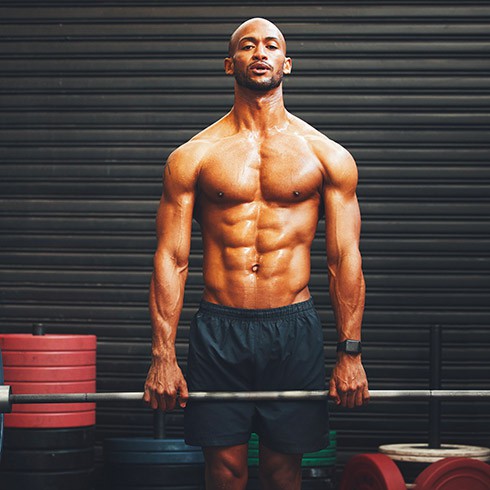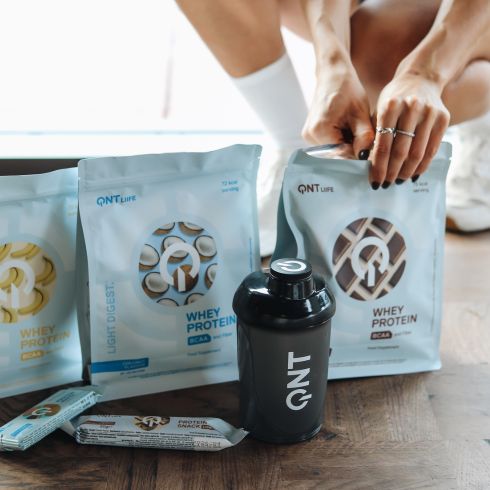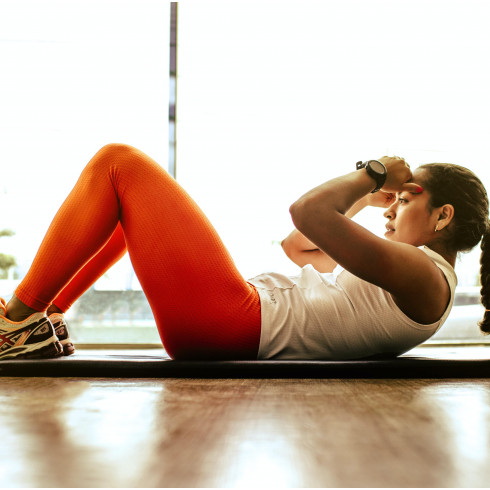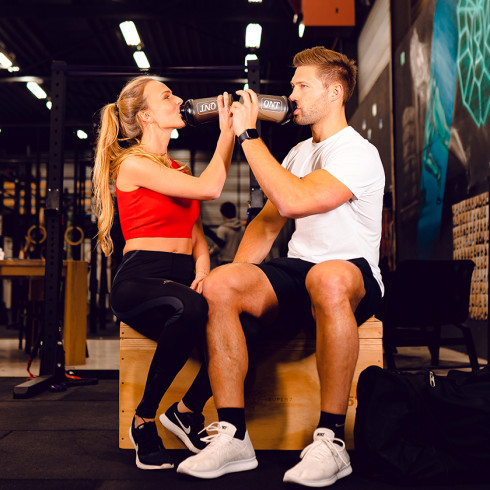Nutrition for Athletes
TABLE OF CONTENTS
- How does an athlete's nutrition differ from that of a sedentary person?
- Are dietary supplements essential for athletes?
- What is the importance of proteins in an athlete's diet?
- Which carbohydrates should be prioritized before a sports competition?
- How to hydrate effectively during physical activity?
- Which foods should be prioritized to optimize recovery after training?
- How to adjust your diet according to the sport practiced?
- What are the signs of poor nutrition in athletes?
- Coach's advice
HOW DOES AN ATHLETE'S DIET DIFFER FROM THAT OF A SEDENTARY PERSON?
The nutrition of an athlete differs from that of a sedentary person in terms of quantity, composition, and meal timing. These adjustments are necessary to meet increased energy needs, support performance, optimize recovery, and prevent injuries. Here are the main differences:
Increased Energy Needs
Athletes burn more calories due to their intense physical activity. Their diet must compensate for this expenditure to maintain energy balance. For example:
- An average sedentary adult requires 2,000 to 2,500 kcal per day.
- An athlete, depending on the intensity and duration of their training, may need between 3,000 and 5,000 kcal, or even more.
Macronutrient Proportions
The balance between carbohydrates, proteins, and fats differs in athletic nutrition:
- Carbohydrates: They are the primary energy source for prolonged or intense efforts. An athlete should consume 50% to 60% of their caloric intake as carbohydrates, compared to 40% to 50% for a sedentary person.
- Proteins: Essential for muscle repair and growth, athletes have higher protein needs (1.2 to 2 g/kg of body weight/day) compared to sedentary individuals (0.8 g/kg/day).
- Fats: Fats remain crucial for long-term energy and overall health. Their proportion in the diet (20% to 35% of caloric intake) is often similar for both groups, but athletes should focus on good sources (omega-3, unsaturated fatty acids).
Hydration
Athletes have increased hydration needs due to sweat-related losses. Insufficient hydration can reduce performance and lead to dehydration or cramps. Isotonic drinks, rich in electrolytes, are often recommended to replenish mineral losses.
Meal Timing
The timing of meals is crucial for athletes:
- Before exercise: A meal rich in complex carbohydrates and low in fat is recommended for sustained energy.
- During exercise (for long sessions): Athletes sometimes consume energy drinks or bars to maintain their energy levels.
- After exercise: A snack rich in carbohydrates and proteins is ideal for optimizing recovery.
Supplementation
While not essential for all athletes, dietary supplements (like whey, BCAAs, or vitamins) can be used to meet specific needs, particularly during periods of intense training. Sedentary individuals typically do not require these supplements.
Micronutrients
Athletes must also ensure adequate intake of vitamins and minerals, particularly:
Specific Goals
Athletes adjust their diet according to their goals (performance, endurance, muscle gain, weight loss) and their discipline. A marathon runner will prioritize carbohydrates, while a bodybuilder will focus on proteins.
An athlete's diet is more rigorous, tailored to individual needs, and oriented toward performance and recovery. It differs from a regular diet, which mainly aims to maintain general health without specific constraints related to physical activity.
ARE DIETARY SUPPLEMENTS ESSENTIAL FOR ATHLETES?
Dietary supplements are often perceived as essential allies for athletes, but their use raises questions about their actual necessity. While they can be helpful in specific cases, they should never replace a varied and balanced diet. Here’s an overview of their role, benefits, and the precautions to take before incorporating them into a routine.
When Can Dietary Supplements Be Useful?
Dietary supplements are particularly useful for athletes in the following cases:
- Increased Needs: During intense training phases or competitions, the need for nutrients such as proteins, vitamins, or minerals rises. For example, a bodybuilder may use whey supplements to meet high protein requirements.
- Nutritional Deficiencies: If the diet fails to cover certain needs, such as iron, vitamin D, or omega-3, dietary supplements can fill these gaps.
- Specific Goals: Athletes with goals like muscle gain, improved endurance, or weight loss can benefit from specific supplements (creatine, BCAA, fat burners, etc.).
- Dietary Restrictions: Specific diets (vegetarian, vegan, gluten-free) may limit certain intakes, making supplements like vitamin B12 or iron necessary.
The Benefits of Dietary Supplements for Athletes
- Convenience: Easy to consume, supplements help quickly meet specific needs, such as a post-workout protein dose.
- Performance Optimization: Some supplements, like caffeine or creatine, are scientifically proven to enhance performance during specific activities.
- Improved Recovery: Branched-chain amino acids (BCAA) or blends containing carbohydrates and proteins can aid in faster muscle recovery after exercise.
- Immune Support: Multivitamins, rich in zinc and vitamin C, can boost immunity for athletes undergoing intensive training.
Limits and Precautions
Despite their benefits, dietary supplements are not without risks:
- Do Not Replace a Balanced Diet: They should be seen as a complement to a varied diet rich in natural foods, not a replacement.
- Overdosage: Excessive consumption of certain nutrients (fat-soluble vitamins, iron, etc.) can cause side effects or health risks.
- Quality and Regulation: Not all supplements are created equal. Some products contain banned substances or inaccurate doses. It is essential to prioritize certified, high-quality brands.
- Placebo Effect: In some cases, the perceived effect by athletes may be more related to their expectations than the actual product effects.
The Most Common Supplements for Athletes
- Protein Powder (whey, casein): For muscle recovery and mass gain.
- Creatine: Enhances strength and performance during short, intense efforts.
- BCAA: To reduce muscle breakdown and support recovery.
- Omega-3: Helps reduce inflammation and promotes overall health.
- Multivitamins: To address potential deficiencies.
- Glucosamine and Chondroitin: For joint health, especially in high-impact sports.
The Importance of Consulting a Professional
Before integrating dietary supplements, it is recommended to consult a healthcare professional (doctor, nutritionist, dietitian). They can:
- Assess the athlete's specific needs.
- Identify potential deficiencies or gaps.
- Recommend suitable products while considering potential contraindications.
Dietary supplements can be a valuable aid for athletes, especially in cases of increased needs or specific deficiencies. However, they should not be consumed systematically or without control. A balanced diet remains the fundamental pillar for achieving athletic goals, and supplements should serve as support, carefully chosen and under the guidance of a professional.
WHAT IS THE IMPORTANCE OF PROTEINS IN AN ATHLETE'S DIET?
Proteins are a key component of an athlete's diet. Their role goes far beyond merely supporting muscle growth, encompassing essential functions for performance, recovery, and overall health. Here’s a detailed overview of their importance and how they impact athletic performance.
Muscle Building and Repair
Proteins are composed of amino acids, which act as building blocks for muscles. During physical exertion, muscle fibers experience micro-tears. Proteins help with:
- Repairing damaged muscles after training, aiding in their reconstruction.
- Muscle growth (hypertrophy) in response to regular training, particularly in strength sports like bodybuilding.
Energy Production
While carbohydrates are the primary energy source, proteins also play a role in energy production, particularly:
- When carbohydrate and fat reserves are insufficient, the body can use amino acids to produce energy.
- This phenomenon, though secondary, can be crucial during prolonged efforts or strict dieting.
Support for Connective Tissues
Proteins also contribute to the health and regeneration of non-muscular tissues:
- Tendons and ligaments: Proteins promote their strengthening, reducing the risk of injuries.
- Skin and bones: They aid in cell regeneration and maintaining bone density.
Recovery and Adaptation
After training, the body needs protein intake to initiate recovery processes. This intake helps:
- Reduce soreness: By improving the repair of muscle fibers.
- Optimize training adaptation: The body becomes stronger and more efficient as it adapts to imposed stimuli.
How Much Protein Does an Athlete Need?
Protein requirements vary depending on physical activity, body weight, and goals. Generally:
- Sedentary person: 0.8 g/kg of body weight/day.
- Endurance athlete: 1.2 to 1.6 g/kg/day.
- Strength athlete or bodybuilder: 1.6 to 2.2 g/kg/day. These needs should be distributed throughout the day to maximize absorption. Some professionals even go higher than 3 g/kg/day.
Protein Sources for Athletes
Athletes should prioritize varied sources to meet all amino acid needs:
- Animal proteins: Lean meats, eggs, fish, dairy products.
- Plant proteins: Legumes (lentils, chickpeas), tofu, quinoa, nuts.
- Dietary supplements: Whey or plant-based protein powders can be useful, especially post-workout, for a quick and convenient intake.
Timing and Absorption
The timing of protein consumption plays a crucial role in their effectiveness:
- Post-workout: A protein-rich snack within 30 minutes after training optimizes recovery.
- Before bed: A portion of casein (slow-digesting protein) can support muscle regeneration during sleep.
Risks of Insufficient or Excessive Protein Intake
- Insufficient intake: Can lead to muscle loss, slow recovery, and increased risk of injuries.
- Excessive intake: Can overburden the kidneys and offers no additional benefits once needs are met. It is important to follow recommendations tailored to your profile.
Proteins are essential for athletes as they support muscle building and repair, optimize recovery, and contribute to vital functions such as maintaining connective tissues. While adequate intake is crucial, the quality and timing of consumption are equally important. A balanced diet, combined with appropriate protein sources, is key to maximizing training benefits and improving performance.
WHICH CARBOHYDRATES SHOULD BE PRIORITIZED BEFORE A SPORTS COMPETITION?
Carbohydrates are the primary energy source for the body, especially during prolonged or intense physical efforts. Before a sports competition, strategic carbohydrate consumption is essential to maximize performance. Here’s a guide to understanding which carbohydrates to prioritize and how to incorporate them into optimal preparation.
Why Are Carbohydrates Essential Before a Competition?
Carbohydrates are converted into glycogen, which is stored in the muscles and liver. During exercise, this glycogen serves as the primary fuel, especially for high-intensity activities. Consuming carbohydrates before a competition helps to:
- Replenish glycogen stores: Ensuring that muscles have sufficient energy.
- Delay the onset of fatigue: By preventing a drop in blood sugar levels.
- Improve performance: By providing a readily available energy source.
Which Types of Carbohydrates Should Be Prioritized?
Carbohydrates to consume before a competition are categorized based on their glycemic index (GI), which measures their impact on blood sugar levels.
Complex Carbohydrates (Low to Moderate GI)
They provide sustained and stable energy, ideal for the hours leading up to the effort:
- Examples: Brown rice, whole-grain pasta, quinoa, sweet potatoes, oats.
- Advantages: Their slow digestion prevents spikes and crashes in blood sugar, ensuring steady energy.
Simple Carbohydrates (High GI)
They are useful close to the effort for a quick energy boost:
- Examples: Fruits (bananas, dates), fruit juices, honey, white bread.
- Advantages: They are quickly digested and absorbed, providing an immediate energy boost.
When to Consume Carbohydrates Before a Competition?
The timing of carbohydrate consumption is as important as their type:
24 to 48 Hours Before the Competition:
- Goal: Load glycogen stores.
- Tip: Increase complex carbohydrate intake while slightly reducing fats and fibers to facilitate digestion.
3 to 4 Hours Before the Competition:
- Goal: Provide a stable energy base.
- Tip: Opt for a meal rich in complex carbohydrates, paired with lean proteins and low in fats.
1 to 2 Hours Before the Competition:
- Goal: Maintain optimal energy levels.
- Tip: Have a light snack of simple carbohydrates, such as a banana or an energy bar.
Recommended Carbohydrate Intake
The amount of carbohydrates depends on the duration and intensity of the effort. In general:
- Endurance Sports (marathon, triathlon): 8 to 12 g of carbohydrates per kg of body weight in the 24 hours leading up to the event.
- Short and Intense Effort Sports (sprinting, weightlifting): 5 to 7 g of carbohydrates per kg of body weight.
Example Nutrition Plan Before a Competition
The Day Before:
- Dinner: Brown rice, chicken breast, cooked vegetables.
- Snack: Fruit compote with honey.
Competition Day:
- Breakfast (3-4 hours before): Oatmeal, dried fruits, a bit of honey.
- Snack (1-2 hours before): A banana or fruit juice.
Errors to Avoid
- Avoid high-fiber or high-fat foods: They can slow digestion and cause digestive discomfort.
- Do not try new foods: Stick to foods that have been tested during training.
- Do not neglect hydration: Always pair carbohydrates with adequate hydration.
Before a competition, complex carbohydrates such as whole grains, vegetables, and tubers are ideal for providing long-lasting energy. Simple carbohydrates, on the other hand, can be useful in small amounts just before the effort. Carefully planning carbohydrate consumption based on timing and specific needs is essential to optimize performance and prevent premature fatigue.
HOW TO HYDRATE EFFECTIVELY DURING PHYSICAL ACTIVITY?
Hydration is a key element in athletic performance and maintaining good health during physical activity. Even slight dehydration can reduce performance, increase the perception of fatigue, and pose health risks. Here’s how to adopt an effective hydration strategy to optimize your training or competitions.
Why Is Hydration Crucial During Physical Activity?
During physical activity, the body loses water mainly through sweating and breathing. These water losses lead to:
- A decrease in blood volume, affecting oxygen delivery to the muscles.
- An increase in body temperature, making the body less efficient at regulating heat.
- Reduced performance, even with just 1-2% body weight lost through dehydration.
Proper hydration helps maintain essential bodily functions and delay the onset of fatigue.
How Much Water Should You Drink During Physical Activity?
Hydration needs vary depending on the intensity and duration of the activity, as well as the temperature and humidity. General recommendations include:
- 150 to 250 ml of water every 15 to 20 minutes.
- 500 to 750 ml per hour for moderate to intense efforts.
These amounts can be adjusted based on individual losses, measured by the difference in body weight before and after exercise.
What Drinks Should You Choose?
For efforts lasting less than 1 hour:
- Plain water is sufficient to replace water losses.
- If the effort is low intensity, drinking according to thirst may suffice.
For prolonged or intense efforts (beyond 1 hour):
- Isotonic drinks are ideal as they contain electrolytes (sodium, potassium) and carbohydrates:
- Electrolytes: Replace sweat losses and help maintain water balance.
- Carbohydrates: Provide immediate energy for sustained efforts.
- Homemade alternatives: Mix water, a little fruit juice, a pinch of salt, and sugar.
For very long efforts (marathons, triathlons):
- Hypertonic drinks, rich in carbohydrates, can be consumed alongside isotonic drinks.
The Role of Electrolytes
Electrolytes (sodium, potassium, magnesium) play a crucial role in:
- Regulating hydration and water distribution in the body.
- Muscle contraction, essential for preventing cramps.
- Maintaining acid-base balance.
A drink containing 500 to 700 mg of sodium per liter is generally sufficient to compensate for losses.
When Should You Drink During Physical Activity?
Hydration should be planned and regular to avoid dehydration:
- Before the effort: Drink 400 to 600 ml of water about 2 hours before activity to start well-hydrated.
- During the effort: Hydrate regularly every 15 to 20 minutes, even if you don’t feel thirsty.
- After the effort: Continue drinking to replace losses and aid recovery.
Common Mistakes to Avoid
- Waiting until you’re thirsty: Thirst is a late signal of dehydration.
- Drinking too much plain water during prolonged efforts: This can lead to hyponatremia (excessive dilution of sodium in the blood), which is dangerous.
- Underestimating environmental conditions: In hot or humid weather, water losses increase significantly.
How to Assess Water Loss?
To evaluate your needs, weigh yourself before and after physical activity:
- Weight difference: 1 kg lost = approximately 1 liter of water to replace.
- Optimal hydration: Rehydrate with 1.5 times the weight lost (e.g., 1 kg lost = 1.5 L of water to drink after exercise).
Effective hydration during physical activity relies on regular consumption of water or isotonic drinks, tailored to the duration and intensity of the activity. Drinking 150 to 250 ml every 15 to 20 minutes is a good starting point, but it's essential to adjust this amount based on your individual losses and environmental conditions. By anticipating and structuring your hydration, you can maintain your performance and protect your health.
WHICH FOODS SHOULD BE PRIORITIZED TO OPTIMIZE RECOVERY AFTER TRAINING?
Post-workout recovery is a vital step to allow the body to regenerate, rebuild muscles, and replenish energy stores. An appropriate diet plays a crucial role in this process. Here’s a detailed guide on the foods to prioritize to maximize recovery.
Why Is Nutritional Recovery Important?
During training, muscles experience micro-tears, glycogen stores are depleted, and the body loses electrolytes. Adequate nutritional recovery allows you to:
- Repair damaged muscle fibers.
- Replenish glycogen stores.
- Reduce muscle fatigue and soreness.
- Prepare the body for upcoming training sessions.
Essential Macronutrients for Recovery
Carbohydrates: Replenish Glycogen Stores
Carbohydrates are crucial for restoring energy levels after exercise. Muscles store glycogen, a form of sugar, which is used during physical activity. Post-workout carbohydrate consumption is essential to:
- Restore glycogen levels.
- Promote quick recovery, especially after prolonged or intense efforts.
Foods Rich in Carbohydrates:
- Fresh fruits (bananas, apples, oranges) or dried fruits (raisins, dates).
- Sweet potatoes, rice, pasta, quinoa.
- Whole-grain bread, oats, energy bars.
Proteins: Repair and Rebuild Muscles
Proteins provide the amino acids needed to repair muscles and promote growth. Post-workout protein consumption helps to:
- Stimulate muscle protein synthesis.
- Reduce muscle breakdown caused by exercise.
Foods Rich in Proteins:
- Lean meats (chicken, turkey), fish (salmon, tuna).
- Eggs.
- Dairy products (yogurt, cottage cheese).
- Legumes (lentils, chickpeas, beans).
- Nuts and seeds, tofu, plant-based proteins.
Fats: Prolonged Recovery
While less critical immediately after exercise, fats play a role in long-term recovery. Healthy fats help reduce inflammation and support repair processes.
Sources of Healthy Fats:
- Avocados.
- Nuts, almonds, cashews.
- Vegetable oils (olive oil, flaxseed oil).
- Fatty fish (salmon, mackerel).
Examples of Post-Workout Meals and Snacks
- Recovery smoothie: Banana, milk or yogurt, oats, a scoop of protein powder.
- Quinoa bowl: Quinoa, grilled vegetables, chicken breast, or tofu.
- Whole-grain toast: Almond butter and banana slices.
- Plain yogurt: With berries and a handful of nuts.
- Homemade protein shake: Protein powder, plant-based milk, a date, or a drizzle of honey.
Timing: When to Consume Recovery Foods?
The timing of your post-workout meal is as important as what you eat. The "metabolic window," or the 30-60 minutes following exercise, is the optimal period to maximize recovery:
- Muscles are more receptive to nutrients.
- Glycogen and protein synthesis are accelerated.
Micronutrients Not to Neglect
Electrolytes:
Lost through sweat, they need to be replenished to restore water balance:
- Sodium and potassium: Found in bananas, salted nuts, or isotonic drinks.
- Magnesium: Found in leafy greens, seeds, and dark chocolate.
Antioxidants:
They help reduce inflammation and speed up recovery:
- Vitamin C: Citrus fruits, kiwis, berries.
- Vitamin E: Almonds, avocados, spinach.
Common Mistakes to Avoid After Training
- Skipping the post-workout meal: This can slow recovery and increase fatigue risk.
- Consuming too much fat immediately after exercise: This can slow the digestion of carbohydrates and proteins.
- Not drinking enough: Adequate hydration is essential to support recovery processes.
7. Embrace a Flavorful and Varied Diet
Losing weight while maintaining a balanced diet is more sustainable if meals remain enjoyable and diverse. Avoiding food monotony reduces frustration and helps maintain good habits in the long term.
- Spices and Herbs: Use spices and aromatic herbs to add flavor to dishes without adding unnecessary calories.
- Try New Recipes: Experiment with different types of recipes, such as colorful salads or dishes with a variety of vegetables, to make your diet more enjoyable and diverse.
For optimal recovery after training, prioritize foods rich in carbohydrates to replenish energy stores, proteins to repair muscles, and healthy fats to support inflammatory processes. All of this should be consumed within an hour after exercise to maximize benefits. A well-planned diet, combined with adequate hydration, is key to effectively preparing your body for future performances.
HOW TO ADJUST YOUR DIET BASED ON THE SPORT YOU PRACTICE?
Nutrition plays a fundamental role in athletic performance, and its requirements vary significantly depending on the type of sport practiced. Nutritional needs differ based on whether the primary goal is endurance, strength, speed, or flexibility. Here’s how to adjust your diet according to your sports discipline.
Endurance Sports: Prioritize Carbohydrates
Endurance sports, such as running, cycling, or swimming, involve prolonged efforts that require a significant amount of energy. Glycogen, derived from carbohydrates, is the primary energy source for these activities.
Nutritional Goals:
- Maximize glycogen stores.
- Prevent muscle fatigue and maintain energy throughout the effort.
Endurance Sports: Prioritize Carbohydrates
Endurance sports, such as running, cycling, or swimming, involve prolonged efforts that require significant energy. Glycogen, derived from carbohydrates, is the primary energy source for these activities.
Nutritional Goals:
- Maximize glycogen stores.
- Prevent muscle fatigue and maintain energy throughout the effort.
Recommended Diet:
Before Exercise:
- A meal rich in complex carbohydrates (brown rice, whole-grain pasta, sweet potatoes) 3-4 hours before training or competition.
- A light snack (banana, energy bar) 30-60 minutes before.
During Exercise (if >1h):
Isotonic drinks, gels, or dried fruits for quick carbohydrate replenishment.
After Exercise:
- Quick carbs (fruits, juices) to replenish glycogen, combined with proteins for muscle recovery.
Example sports: Marathon, triathlon, cross-country skiing.
Strength Sports: Focus on Proteins
Strength sports, such as weightlifting, bodybuilding, or CrossFit, require a diet centered on muscle repair and growth. Proteins are essential for promoting muscle hypertrophy.
Nutritional Goals:
- Provide sufficient proteins to support muscle synthesis.
- Maintain adequate caloric intake to prevent muscle loss.
Recommended Diet:
Before Exercise:
- A meal containing carbohydrates (oats, fruits) and a protein source (yogurt, eggs).
After Exercise:
- A protein-rich snack (whey, chocolate milk, fish) within 30 minutes post-workout.
- A complete meal with proteins (lean meats, tofu), carbohydrates (rice, quinoa), and vegetables.
Example sports: Bodybuilding, powerlifting, combat sports.
Speed and Explosive Sports: A Balance of Carbohydrates and Proteins
Speed and explosive sports, such as sprinting, tennis, or football, combine short, intense efforts with recovery periods. These sports require a balance of carbohydrates for energy and proteins for recovery.
Nutritional Goals:
- Quickly provide energy for explosive efforts.
- Prevent muscle soreness and fatigue.
Recommended Diet:
Before Exercise:
- A balanced meal with carbohydrates (whole-grain bread, fruits) and proteins (eggs, cottage cheese).
During Exercise:
- Water or isotonic drinks if the effort lasts more than an hour.
After Exercise:
- Quick carbs (fruits, honey) and proteins (Greek yogurt, protein shake) to aid recovery.
Example sports: Sprinting, basketball, hockey.
Flexibility and Focus Sports: Light and Balanced Diet
Sports like yoga, gymnastics, or dance require a diet that promotes lightness and focus while providing the energy needed for technical movements.
Nutritional Goals:
- Maintain a constant energy level.
- Avoid heavy or hard-to-digest meals.
Recommended Diet:
Before Exercise:
- Light, easy-to-digest snacks like fruits, nuts, or yogurt.
After Exercise:
- A balanced meal including lean proteins (fish, tofu), complex carbohydrates (quinoa, root vegetables), and healthy fats (avocado, almonds).
Example sports: Yoga, Pilates, classical dance.
Mixed Sports: Varied Needs
Sports combining endurance, strength, and speed, such as football, rugby, or triathlon, require a versatile nutritional approach.
Nutritional Goals:
- Maintain high energy reserves.
- Promote muscle recovery.
- Support hydration and electrolyte balance.
Recommended Diet:
- Before Exercise: Complex carbohydrates for energy (pasta, rice), paired with proteins.
- During Exercise: Isotonic drinks or energy bars if the effort exceeds 60 minutes.
- After Exercise: A mix of carbohydrates and proteins within 2 hours of activity.
Example sports: Football, rugby, triathlon.
The Importance of Hydration
Regardless of the sport, adequate hydration is essential. Hydration needs vary depending on the intensity of the effort and weather conditions, but it is recommended to drink regularly before, during, and after activity.
Adapting your diet to the type of sport practiced helps meet specific energy, nutrient, and recovery needs. Endurance sports require an increased intake of carbohydrates, while strength sports prioritize proteins. For every discipline, a well-planned and tailored nutritional strategy is the key to optimizing performance and accelerating recovery.
WHAT ARE THE SIGNS OF POOR NUTRITION IN ATHLETES?
An inadequate diet can significantly impact an athlete's performance, health, and recovery. Identifying the signs of poor nutrition is crucial to correcting dietary mistakes and maintaining optimal performance levels. Here are the key indicators to watch for.
Increased Fatigue and Energy Loss
One of the first signs of poor nutrition is persistent fatigue, which may appear even outside of training sessions:
Possible Causes:
- Insufficient caloric intake, especially for athletes engaging in intense or prolonged activities.
- A deficit in carbohydrates, the primary energy source for physical efforts.
- Inadequate hydration, leading to decreased performance.
Consequences:
- Difficulty maintaining exercise intensity.
- Feeling exhausted after low-intensity workouts.
Decreased Performance
A poorly adapted diet can directly affect athletic performance:
Symptoms:
- Reduced muscular strength.
- Loss of endurance or difficulty sustaining prolonged efforts.
- Decreased speed or explosiveness.
Possible Causes:
- Nutritional imbalances (deficiency in carbohydrates, proteins, or essential micronutrients).
- Poor meal planning before and after exercise.
Frequent Injuries
An insufficient or unbalanced diet can increase vulnerability to injuries:
Examples:
- Sprains, tendinitis, or stress fractures.
Possible Causes:
- Deficiencies in calcium, vitamin D, or proteins affecting bone strength and muscle repair.
- Electrolyte imbalances (lack of sodium, potassium, magnesium) promoting cramps and muscle injuries.
Slow Recovery
Poor nutrition slows recovery processes, which are essential for continued training:
Signs:
- Prolonged muscle soreness.
- Difficulty regaining energy after exercise.
Possible Causes:
- Lack of protein to repair muscle fibers.
- Insufficient carbohydrates to replenish glycogen stores.
- Inadequate hydration, delaying the removal of muscle toxins.
Sleep Disorders
Poor sleep can result from an inadequate diet:
Symptoms:
- Difficulty falling asleep or frequent nocturnal awakenings.
- Feeling tired upon waking.
Possible Causes:
- Excessive consumption of stimulants (caffeine, energy drinks) late in the day.
- Overly restrictive diet causing nighttime hunger.
- Deficiency in magnesium or tryptophan, nutrients that promote restorative sleep.
Muscle Mass Loss
Prolonged protein or calorie deficits can lead to muscle wasting, particularly problematic for strength or endurance sports:
Signs:
- Visible decrease in muscle volume.
- Increased muscle weakness.
Possible Causes:
- Insufficient protein intake relative to needs.
- High energy expenditure not compensated by diet.
Digestive Issues
An unbalanced diet can cause digestive discomfort, directly affecting performance:
Examples:
- Bloating, nausea, stomach cramps.
Possible Causes:
- Excessive fiber intake before exercise.
- Inadequate hydration or consumption of fatty, hard-to-digest foods.
Micronutrient Deficiencies
Poor nutrition can lead to deficiencies, even if macronutrient intake seems adequate:
Common Deficiencies:
- Iron: Causes anemia, leading to significant fatigue.
- Calcium and Vitamin D: Affect bone health.
- Magnesium: Promotes cramps and sleep disturbances.
Consequences:
- General weakness.
- Reduced recovery capacity.
Changes in Body Weight
Significant, unexplained weight fluctuations can signal poor nutritional management:
- Significant weight loss: May indicate insufficient caloric intake.
- Rapid weight gain: Often linked to an unbalanced diet high in fats and simple sugars.
Emotional and Mental Signs
Poor nutrition can also affect mental and emotional states:
Symptoms:
- Irritability, increased anxiety.
- Difficulty concentrating, lack of motivation.
Possible Causes:
- Blood sugar imbalances due to a lack of complex carbohydrates.
- Deficiencies in B vitamins, essential for mental health.
Poor nutrition in athletes can manifest as increased fatigue, decreased performance, frequent injuries, slow recovery, and sleep disturbances. These signs should be taken seriously and addressed quickly to avoid more severe consequences on health and performance. A tailored, balanced, and personalized diet is essential to meet the physical and mental demands of the sport.
COACH'S TIPS

- Your motivations will determine the efforts you're willing to make to reach a specific goal. The bigger the goal, the more important nutrition becomes for optimal performance.
- The key rule to follow is to assess where you stand: if you've reached your goal, you've done what was necessary. If you're making progress, you're on the right track, but if you're not getting closer to your goal, question yourself—whether it's about your training or your nutrition. However, even if you think you're an exception, start by testing the classic principles that work for most athletes.
Related posts
-
 Summer holidays: How to limit the damage?
Posted in: Our tips24/06/2021On holiday, we often tend to let ourselves go. Unless you're a hardcore sportsman, you tend to abandon your trainers...Read more
Summer holidays: How to limit the damage?
Posted in: Our tips24/06/2021On holiday, we often tend to let ourselves go. Unless you're a hardcore sportsman, you tend to abandon your trainers...Read more -
 Which fat burner to choose?
Posted in: Our tips26/05/2021To lose weight and burn fat, there is no secret: you have to do sport and take care of your diet. However, it is...Read more
Which fat burner to choose?
Posted in: Our tips26/05/2021To lose weight and burn fat, there is no secret: you have to do sport and take care of your diet. However, it is...Read more -
 Summer body edition for men: How to prepare your body?
Posted in: Our tips11/05/2021Gentlemen ? The return of the sun and its warm rays are almost here! The degrees are slowly but surely rising, but...Read more
Summer body edition for men: How to prepare your body?
Posted in: Our tips11/05/2021Gentlemen ? The return of the sun and its warm rays are almost here! The degrees are slowly but surely rising, but...Read more -
 9 good reasons to do sport.
Posted in: Our tips22/04/2021Sometimes the urge to exercise is not always there. And although we always tell ourselves that this year will finally...Read more
9 good reasons to do sport.
Posted in: Our tips22/04/2021Sometimes the urge to exercise is not always there. And although we always tell ourselves that this year will finally...Read more -
 Discover how to take care of your faithful companion: your shaker!
Posted in: Our tips07/04/2021In your bag, in your hand, in your sink, it is everywhere! The shaker is an essential element of any good training....Read more
Discover how to take care of your faithful companion: your shaker!
Posted in: Our tips07/04/2021In your bag, in your hand, in your sink, it is everywhere! The shaker is an essential element of any good training....Read more
Blog categories
Popular posts
-
 Looking thinner but at a heavier weight? Is that possible?04/10/2021Posted in: Our tipsAdvertising has shaped our thinking! We have been forced for years to believe that losing weight is the key to having...Read more
Looking thinner but at a heavier weight? Is that possible?04/10/2021Posted in: Our tipsAdvertising has shaped our thinking! We have been forced for years to believe that losing weight is the key to having...Read more -
 Proteins for weight loss !29/12/2023Posted in: Our tipsDive into the fascinating world of proteins and their key role in weight loss. Discover how to choose the best...Read more
Proteins for weight loss !29/12/2023Posted in: Our tipsDive into the fascinating world of proteins and their key role in weight loss. Discover how to choose the best...Read more -
 Which foods boost testosterone levels ?07/05/2021Posted in: Food supplementsTestosterone, often associated with virility, has much more to offer than you might think. It plays a crucial role in...Read more
Which foods boost testosterone levels ?07/05/2021Posted in: Food supplementsTestosterone, often associated with virility, has much more to offer than you might think. It plays a crucial role in...Read more -
 10 BENEFITS OF GLUTAMINE.02/01/2024Posted in: Our tipsDiscover the power of L-glutamine, an underrated superhero in the world of amino acids! Essential for revitalizing...Read more
10 BENEFITS OF GLUTAMINE.02/01/2024Posted in: Our tipsDiscover the power of L-glutamine, an underrated superhero in the world of amino acids! Essential for revitalizing...Read more -
 Is there a link between sex and sport?14/11/2019Posted in: LifestyleMany have already asked questions about sex and sport. Most of the time, people want to be reassured by the many...Read more
Is there a link between sex and sport?14/11/2019Posted in: LifestyleMany have already asked questions about sex and sport. Most of the time, people want to be reassured by the many...Read more

.jpg)

